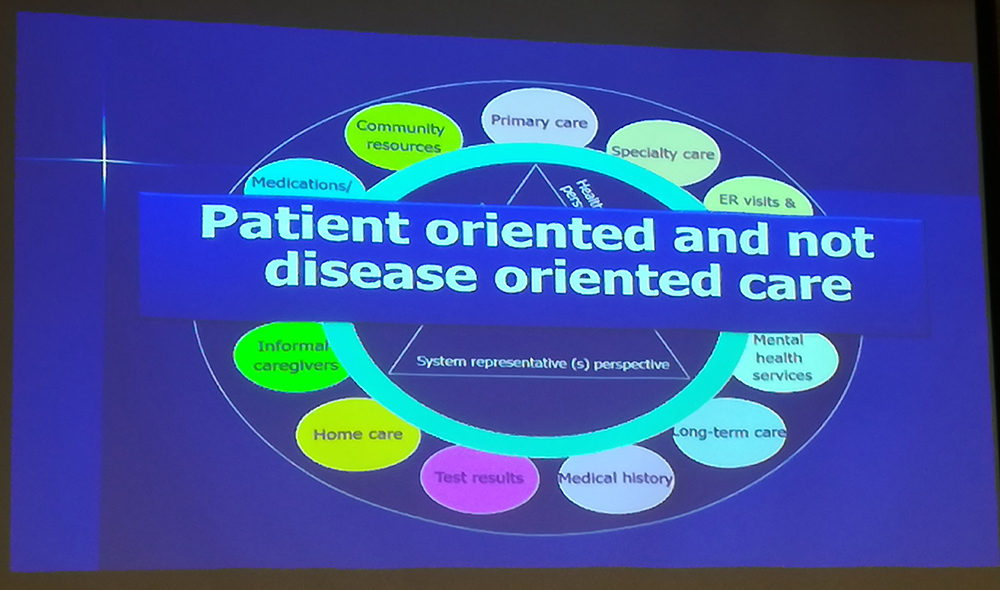Hadassah Mediscope 2019
The day was opened by the President of Hadassah-Israel, Nira Greenstein, who gave a brief update and thanks, and then introduced Professor Yoram Weiss, Director of Hadassah Hospital, Ein Kerem, who told us that Hadassah continues to be a leading hospital for research, reaching 1 million patients a year, and about the infrastructure and medical devices being the most advanced that there is available. He commented that one of the most important things to remember is the dedication of the people who work there, and the patients that are there to be looked after.
We then heard a very moving talk by Dvir Sofer, who spoke about the serious injury to his legs in a terrorist attack that happened on 11th June 2002, but thanks to the staff at Hadassah, 40 operations later, he is walking and leading an active life.
In a session about the Hadassah school, we heard about the framework in which short and long term child patients have the opportunity to continue their education during their hospitalization, either in a classroom, or at their bedside. A child at home has the possibility to be given an IPad with which he or she can follow lessons, or be in contact with other children elsewhere in the country with similar health or emotional problems, and support each other. We heard about the collaboration necessary with teachers and hospital personnel. As well as the medical problems, they strive to recognize the child’s emotional and mental state and give the child the confidence to feel normal and belonging in the world. Parents of various cultures and religions are accepted equally at the hospital and interact together for the sake of their sick children’s well-being and in turn the children learn to get to know and understand children of different cultures and religions, and with different ways of life.One of the most effective intercultural activities is music, and we were given a recital of music and song given by the music therapy team at the Hadassah school. Outstanding was Rania, a beautiful young Arab Christian woman, who sang a song in Arabic and then, believe it or not she sang in Yiddish, the well-known “Chirry Bim’ song to the delight of the audience. There is also the Meducation aspect when the illnesses and treatments are explained and discussed with the young patients in a way they can understand.
Dr Isabella Schwartz, head of the Rehabilitation Department at Hadassah Mount Scopus told us about plans for a new Rehabilitation Centre with improved facilities, and especially designed for rehabilitating patients that will take 3-6 years to be built. At present this department has not changed in the last 20 years, and there is still a shortage of electric beds. The Modi’in chapters recently raised enough money to donate 30 more beds.
Dr Shachar Frankel, a specialist in ocular oncology gave a detailed overview of the department that he heads – pathology, laboratory and clinical research into the various branches and sub-specialities concerning the eye. These include cell biology and genetics. He told us about the important Michaelson factor X which promotes the growth of blood vessels around the eye. VJF injections are given to prevent oxygen getting into any cancerous tumor in the eye. A tumor starved of oxygen will die. But the importance of this is to keep the heart working in good order. Their order of priority is to save lives first, then eyes, then vision.
Professor Alon Moses, Director of Clinical Microbiology and Infectious Diseases, spoke extensively about the spread of germs such as MRSA, a HAI – Hospital Acquired Infection, and the importance of hand washing on entering a hospital ward, and approaching and leaving a patient’s bed. Room cleaning after discharge of a patient is imperative in preventing disease from spreading. It is very difficult to prevent resistant bacteria, which can be found anywhere, and the number of known cases is only the tip of the iceberg. There should be a clear atmosphere of infection control based upon 3 main points: education, guidelines, surveillance. Since 2006 there has been a National Infection Control Committee and good results and improvements are seen in the statistics. There are still not specific anti-biotics, because as he claims, pharmaceutical companies are less interested in patients getting better than patients with chronic conditions who will continue to need medication.
Professor Eitan Kerem, Head of the Pediatrics Division, was most interesting. He told us that children are 30% of the population and 100% of our future and the best investment is to ensure their good health. Changes have led to improvements in children with chronic diseases and better chances of survival for such as extreme premature babies, leukemia, HIV, cystic fibrosis, congenital heart disease. But there are also new epidemics that have developed out of modern living such as obesity, ADHD, depression. A child cancer survivor, who is cured, may never fully recover from the emotional scars. Babies who are premature may grow older with various challenges such as learning and academic limitations, motor skill problems, deafness etc. The process continues throughout the children’s lives because they must undergo continual check-ups, and monitoring, which in turn means time off school. Some parents may try to hide details from the child instead of explaining and answering questions, and the child may feel that the illness is something to be ashamed of, feel rejected, and ask ‘Why me?’, even a fear of death. Professor Kerem showed a number of slides describing the psychological impact that lead to varying different attitudes of people in the child’s family and friend’s circle. This was a real eye opener to help understanding of what children and their families go through in times of serious illness. To end, he quoted an IDF soldier with Aspergers who succeeded in being recruited: “I have no difficulties – I have only challenges”.
Recorded: Marion Stone


